We all know that playing is a natural and enjoyable way for kids to stay healthy, active, and happy. But did you know that play is also a powerful tool in promoting cognitive development in early education?
Beyond just exposure to language and motor activities, children need to develop self-control, conflict resolution, and emotional resilience—skills that are all enhanced through play-based education. Now a staple in many preschool settings, this approach has been linked to crucial skills like collaboration, communication, critical thinking, and self-confidence. And it’s not just for schools; parents and au pairs can also encourage these skills at home, creating enriching environments where children can explore, experiment, and discover at their own pace.
In this article, we’ll explore play-based learning and the benefits of a play-based curriculum. We’ll also offer practical advice on integrating this enriching educational approach at home. Ready to turn your living room into a classroom? Let’s explore how.
What is Play-Based Learning?
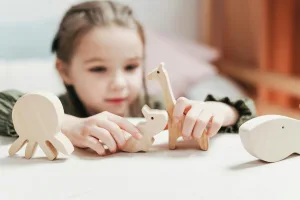 Play-based learning, by definition, is an educational approach that centers around a child’s natural inclination to play. In its simplest form, it is learning through play. Friedrich Froebel, credited as the inventor of the kindergarten, believed that “play is the highest expression of human development in childhood, for it alone is the free expression of what is in a child’s soul.” In other words, he considered that play was crucial in the learning process, especially during early childhood.
Play-based learning, by definition, is an educational approach that centers around a child’s natural inclination to play. In its simplest form, it is learning through play. Friedrich Froebel, credited as the inventor of the kindergarten, believed that “play is the highest expression of human development in childhood, for it alone is the free expression of what is in a child’s soul.” In other words, he considered that play was crucial in the learning process, especially during early childhood.
Play-based learning in early childhood development can be highly effective because it aligns with how children naturally learn and develop. Play allows kids to take on different roles, try out new ideas, and solve problems in a safe and supportive environment. It fosters creativity, imagination, and innovation while promoting social skills such as cooperation, communication, and empathy.
The Power of Play-Based Learning
Scientific research over the past few decades has shown us that the most important period of human development is from birth to eight years old. That’s not to say that what kids learn (or don’t) when they’re older won’t influence their development. Still, the cognitive skills, emotional-regulation strategies, and social intelligence children develop during these years will build a strong foundation for success well into adulthood.
For children of these ages, play-based preschool and at-home activities that encourage having fun, unstructured exploration, and hands-on learning can have countless benefits:
Enhances Cognitive Development
Play-based learning engages children in activities that challenge their cognitive abilities, such as problem-solving, critical thinking, and decision-making. Whether building structures with blocks or playing hide-and-seek, kids constantly use their brains to make sense of the world around them. Through these experiences, they develop cognitive skills like spatial awareness, logical reasoning, and mathematical concepts.
Fosters Communication Skills
Play gives kids a natural and effective platform to develop and enhance their communication skills. Learning through play encourages children to use their words to communicate their thoughts, feelings, and ideas, as well as to listen and respond to others. Plus, play often involves negotiating, sharing, and resolving conflicts, which require effective communication skills.
Improves Social Skills
Playing teaches kids how to socialize with others. Children can develop critical social skills like sharing, empathy, and cooperation through play. They can also learn to communicate effectively, respect others’ boundaries, and work towards common goals. These skills are essential for building healthy relationships and can help lay the foundation for successful teamwork and collaboration in academic and professional settings later in life.
 Encourages Creativity and Imagination
Encourages Creativity and Imagination
Play-based learning is an excellent way to foster creativity and imagination. It provides a safe and judgment-free environment for kids to explore, experiment, and create freely. Play encourages children to think outside the box, consider new possibilities, and express themselves in unique and imaginative ways.
Supports Physical Development
Early childhood play-based learning encourages kids to stay active and supports physical development, which, in turn, improves physical and mental health. Whether they are running, jumping, or climbing, kids can develop gross motor skills, coordination, strength, and endurance during active play. Drawing, painting, and manipulating small objects can also help refine fine motor skills.
Builds Emotional Resilience
Learning through play helps children develop emotional resilience by allowing them to explore and express their feelings in a supportive environment. Children learn to regulate emotions, cope with stress, and develop compassion for others during play.
Promotes Independence and Decision-Making
Play-based learning empowers kids to take ownership of their learning and develop essential life skills such as independence and decision-making. During play, children have the freedom to make their own choices, solve problems, and take risks in a controlled environment.
Enhances Attention and Persistence
Playing allows children to engage in activities that capture their interest and hold their attention over prolonged periods. Play-based learning also encourages them to persevere in the face of challenges, try new strategies, and learn from their mistakes.
The 5 Elements of Play-Based Learning
While play-based learning in early education should always be open-ended for the kids, teachers and parents must have a somewhat clear learning goal and keep it in mind to subtly guide and encourage the child toward achieving it. To effectively accomplish this, incorporating the five elements of play-based learning is essential:
Self-chosen
Children should have the freedom to choose their activities and interests. Teachers, parents, and other educators can suggest games and activities while empowering them to follow their curiosity. Allowing children to make their own choices fosters a sense of independence and confidence crucial for their development and learning.
Enjoyable
Children must enjoy the activities or games they’re playing for play-based learning to be effective. This means that adults shouldn’t communicate any overt goals or objectives for the exercises. Ensuring the fun aspect of learning helps maintain intrinsic motivation, which is critical to sustaining engagement and encouraging a lifelong love of learning.
 Unstructured
Unstructured
Play-based learning environments should provide flexibility and freedom for children to explore and create without rigid rules or set outcomes, allowing for open-ended exploration and discovery. This freedom nurtures creativity and helps children develop autonomy and initiative as they learn to make decisions and pursue their own interests.
Process-Oriented
The focus in play-based learning should be on the process rather than the result, emphasizing experimentation, problem-solving, and learning through trial and error. This approach encourages children to value the learning journey, building resilience and persistence as they understand that mistakes are not failures but opportunities for growth and learning.
Imaginative
Play-based learning should encourage kids to use their imagination and creativity to invent new scenarios, explore different roles, and engage in pretend play, supporting cognitive development and self-expression.
Play-Based Learning Activities
So, what does play-based learning in early childhood education look like? Here are some activities parents and caretakers can do with children to encourage play-based learning at home and school:
Block Building
There’s a reason why block building is a staple in every play-based curriculum. Preschool children learn essential life skills through block play, including spatial reasoning, hand-eye coordination, and dexterity. Plus, kids begin to think about math and geometry when playing with blocks, even if they don’t realize it: they count, compare sizes, combine two shapes to make a new one, test hypotheses, and implement their reasoning skills.
Dress-up and Role Play
Dress-up and role-play games allow children to step into different roles and explore various scenarios, sparking their imaginations and creativity. Through role-play, kids can also practice social skills such as communication, cooperation, and conflict resolution.
Sand and Water Play
Sand and water play can stimulate exploration, creativity, and scientific thinking. Plus, it promotes fine motor skills and hand-eye coordination as kids scoop, pour, and mold shapes. Open-ended activities like sand and water play also foster curiosity, problem-solving, and independence.
Arts and Crafts Making
Arts and crafts activities allow kids to express their creativity and individuality while developing fine motor skills, hand-eye coordination, and cognitive abilities. These activities can also promote problem-solving and critical thinking.
 Storytelling and Puppet Shows
Storytelling and Puppet Shows
Storytelling and puppet shows are great for imagination and can help promote a love for reading and literature. Kids will develop language skills such as vocabulary, grammar, and comprehension, whether listening to stories or creating their own.
Find an Au Pair with Go Au Pair
Play-based learning is more than an educational approach; it’s a gateway to limitless possibilities for a child’s enjoyment, growth, and development. This holistic method ensures that children are academically prepared and well-rounded individuals capable of navigating complex social environments and challenges.
As children grow, the benefits of play extend beyond immediate learning outcomes. It shapes their ability to think critically, solve problems creatively, and interact effectively with others. These skills are invaluable as they transition to more structured educational settings and, eventually, the workplace.
Incorporating an au pair into your child’s learning environment can significantly enrich this experience. Au pairs bring a fresh perspective and introduce new and diverse play-based activities that are both educational and engaging.
Visit Go Au Pair today to discover how an au pair can transform playtime into a profound learning experience. Explore our services to find the perfect au pair for your family and understand our host family requirements. Embark on this rewarding journey today and watch your child flourish in an environment where learning seamlessly integrates with play.


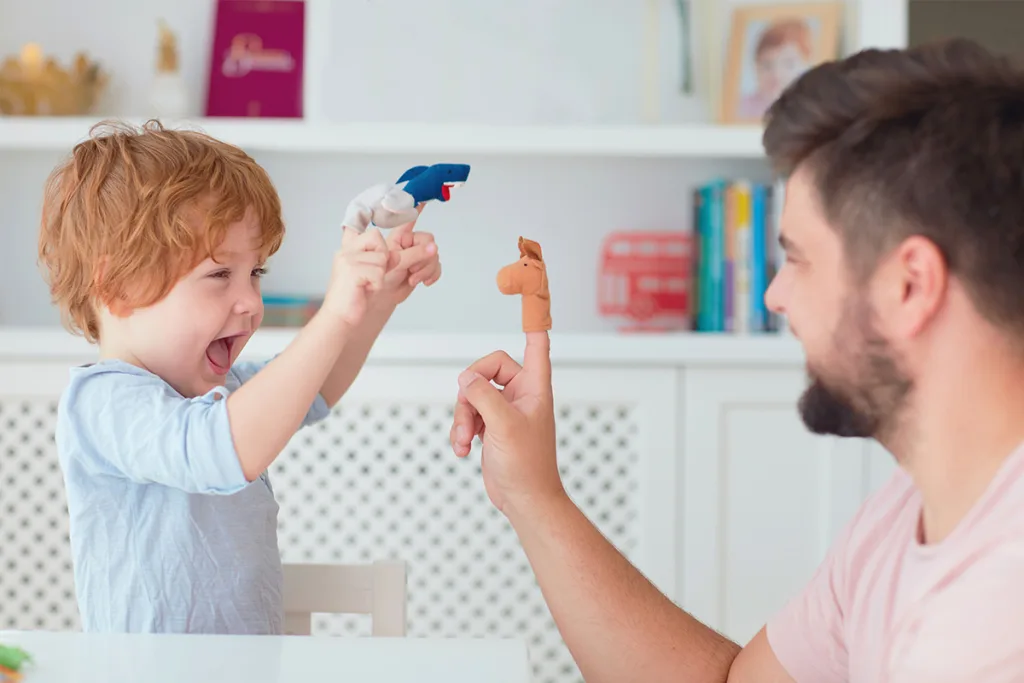
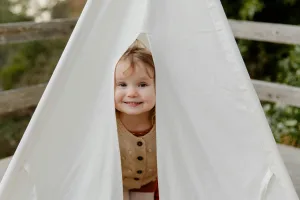 Encourages Creativity and Imagination
Encourages Creativity and Imagination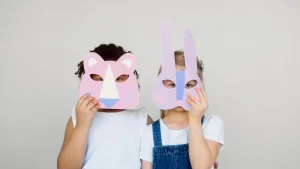 Unstructured
Unstructured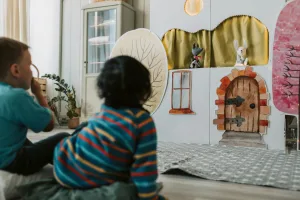 Storytelling and Puppet Shows
Storytelling and Puppet Shows